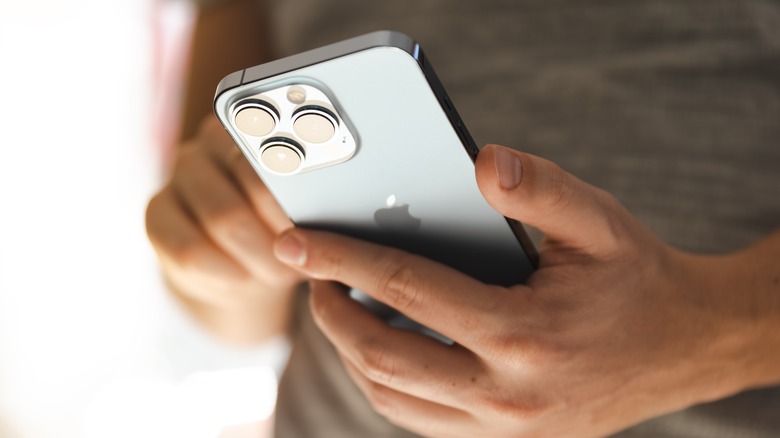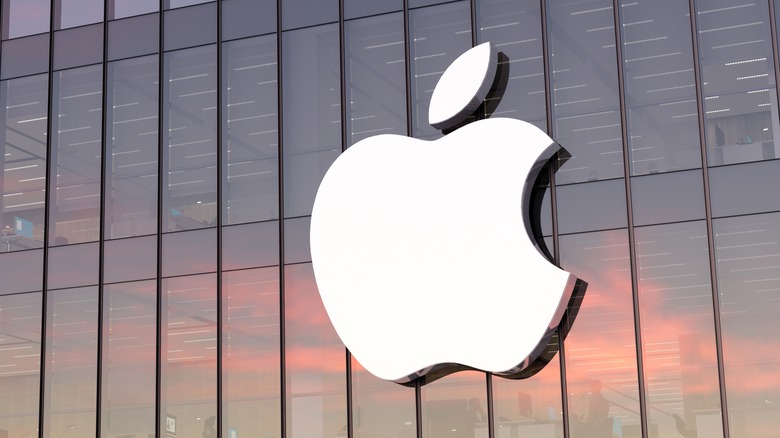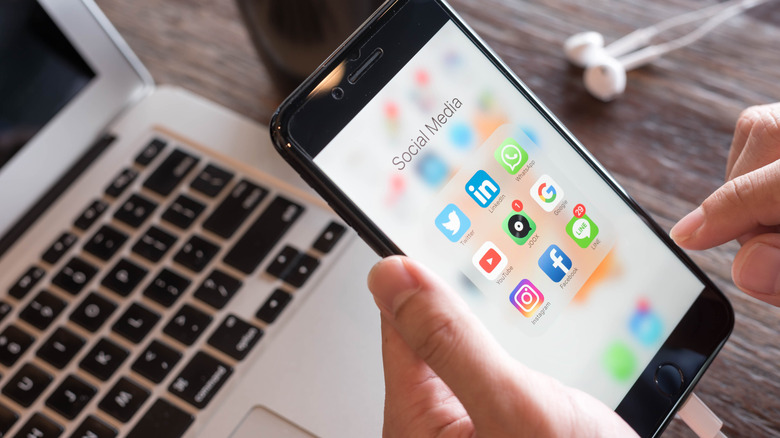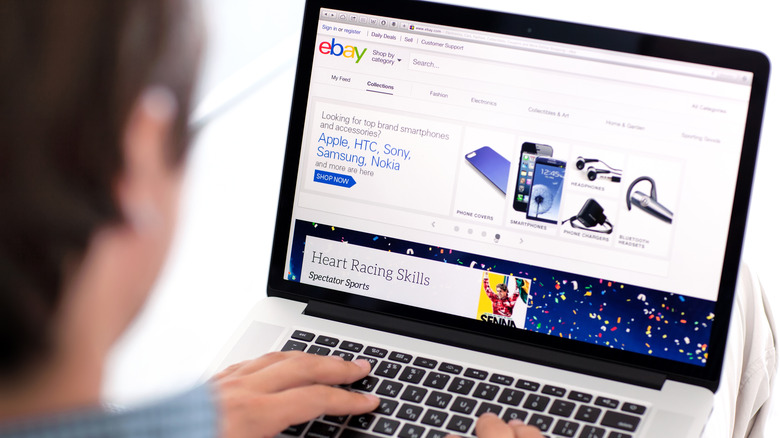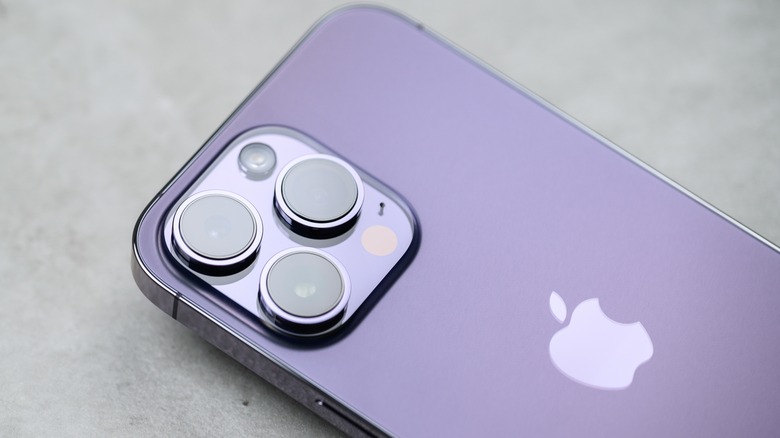Is It Better To Sell Or Trade In Your Old iPhone? Here's What You Need Know
Picture this: you are currently the owner of an old iPhone. Considering how long you've had it in your possession, you realize that it actually is still in excellent condition — there are no visible scratches on the device, and all of the features work. While continuing to use the device seems like a perfectly reasonable thing to do, you take a look at the Apple website, see the newest iPhone series, and decide to upgrade. How do you make it happen?
Of course, you can just outright buy a new iPhone, recycle your old one, and never look back. However, the more financially smart way to go about the upgrade is to either trade in your current iPhone directly to Apple or a wireless carrier, or to sell it yourself to a private buyer and then use the money to help pay for the new device. You can potentially get some money back no matter which method you choose — it's just a matter of figuring out which option is best for you.
Trading in an iPhone is the most convenient option
Apple has an in-house gadget appraising program that is pretty straightforward to use: there's a nifty list of all the eligible iPhone models with their corresponding approximate values, which refers to the potential amount of money you'll get for handing over the phone to Apple. There's also an automated estimator that'll outright tell you how much money you can get back once you provide information on your current iPhone's physical condition and overall functionality, assuming you give accurate information.
Purely in terms of convenience, this is the best option, as you can trade in your iPhone and buy a new one all in one transaction. There's no need to venture outside of the Apple sphere and worry about snags in the process because every step is already baked in, including the shipping costs associated with the old device and the packaging you'll need to use in order to send it in. Apple isn't your only option when it comes to trade-ins, however.
There are also advantages to trading in your device through a mobile phone carrier. All phone service providers want to gain or retain your business, so whether you're staying with your current one or jumping ship to another, the company will likely make upgrading to a newer iPhone as seamless and as enticing as possible by offering deals (via Verizon). These perks may include things like a phone bill discount or waiving certain fees, though you'll need to make sure you read and understand all of the terms carefully to avoid bad deals.
You'll probably get less money by trading in an iPhone
While it's great that Apple and wireless carriers can remove all of the guesswork that comes with ditching your old iPhone, there are certain caveats. For instance, if you are hoping to trade in an iPhone 6S at Apple, you are out of luck. Models older than the iPhone 7 are not eligible to trade in for Apple credit and can only be handed over to be recycled. Apple may also reject your trade-in if the iPhone isn't in good enough shape. Of course, this may not be too big of a deal if you have an older phone — these same aging devices don't go for much on the used market, either (via Swappa), and so you'll need to keep that in mind when deciding whether it's worth the hassle of selling the device at all.
Another thing worth mentioning is the value tacked on to specific iPhone models. No matter how well you've maintained your current iPhone, trade-in offers are almost always lower than what you'd get from selling the device to a private buyer. This lower valuation is considered the price you pay for the convenience that comes with trading in an iPhone, but it may not be worth it if you're looking to get rid of a fairly new handset that's in good condition. Beyond that, keep in mind that whatever amount you get, it'll be in the form of a gift card or exclusive store credit that won't be redeemable elsewhere, unlike cash.
Selling an iPhone may get you more money, but it's a hassle
If you are hoping to tack a higher price on your older, well-maintained iPhone, selling it yourself is probably the way to go. You can almost always sell a smartphone for more than you'd receive through a trade-in deal, and the funds you get will be in the form of cash. This is the better option if you've already purchased the new iPhone; by selling the old device for cash, you can put that money into your bank account or use it to pay off your credit card. In comparison, credit earned through trade-in deals can only be used with the company that accepted the device, so that's something you'd only want to do if you haven't yet purchased the new phone.
That aside, selling gadgets online is no walk in the park. You will need to manually post ads on third-party platforms, take and upload images of the device, and communicate with any interested buyers. You will also need to ship the iPhone to the buyer or take the risk of meeting a stranger for an in-person swap. You will also need to factor in any seller fees you may pay by using sites like eBay.
There's also a slew of potential risks that could derail the final sale, such as buyers backing out or falling victim to a scammer. If you're the type of person who thrives as a multitasker or you're already experienced in online selling, then offloading the old iPhone yourself may be the way to go. If, on the other hand, this all sounds like a confusing hassle, you'll probably want to trade in the iPhone instead.
Factors to consider when comparing trade-in and private sale options
At the end of the day, there are two main questions you really need to ask yourself when it comes to switching from an old iPhone to a new one. First of all, how quickly do you want the new device? Secondly, how much money are you willing to spend? Depending on the answers to both of these questions, other factors will be a lot easier to figure out. Bear in mind that in this particular situation, money is not the only currency in question — you also have to take into account how much extra time you have to spend on whatever method you decide to pick as well as the amount of effort you are willing to take to make it happen.
Selling your old iPhone is best if you want or need to get as much money for it as possible, have time to spare, and don't mind doing all of the work yourself. On the other hand, trading in your iPhone is best if you prefer the convenience and peace of mind afforded by letting a company handle things for you — and, of course, you don't mind getting less money for the phone. Either way, you'll have your new iPhone to make the effort worth it in the end.
